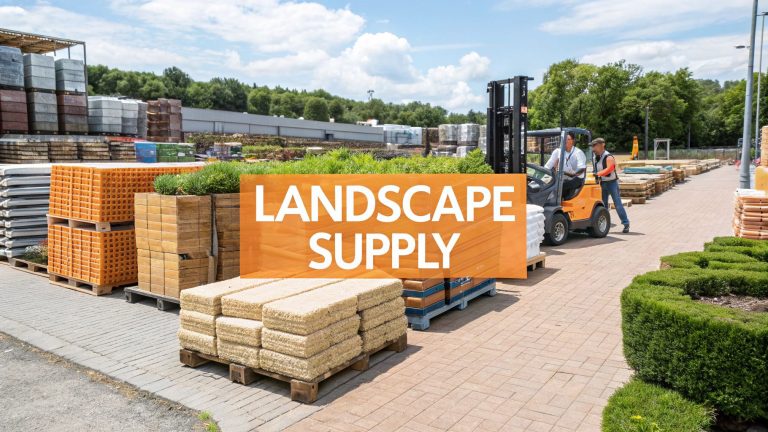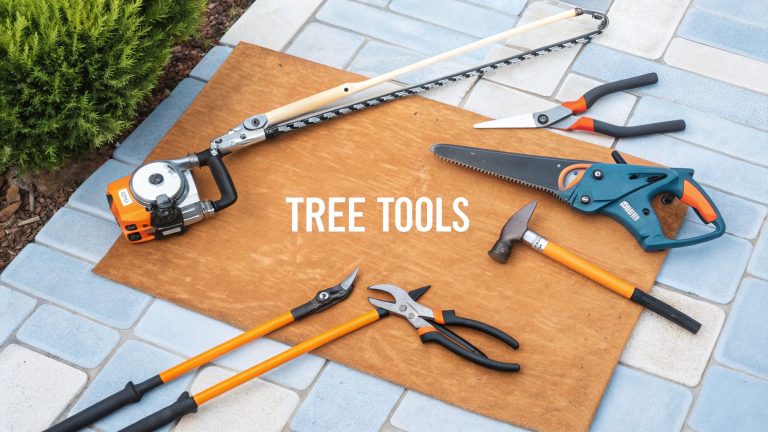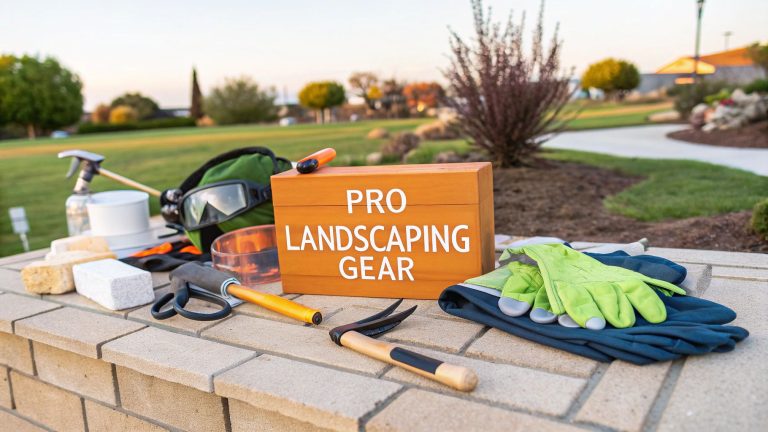If you’re wondering how to start a landscaping business in Orange County, it all begins with a solid plan. Trying to wing it is like building a retaining wall on soft dirt—it won’t hold. A little preparation now sets the foundation for long-term success
For anyone asking how to start a landscaping business in Orange County the right way, it all starts here. This isn’t about a 50-page document that collects dust. It’s about thinking through a few key things that will guide every decision you make, especially in a competitive market like Orange County.
Your Foundation for a Thriving Landscaping Business in Orange County
Let’s get the essentials down on paper. A little planning now saves a massive headache later.
Define Your Niche and Services
First things first: what kind of work do you actually want to do? Are you aiming to be the go-to crew for weekly lawn maintenance in Irvine, or are you chasing bigger commercial contracts in Anaheim? Both can make you good money, but they demand different equipment, skills, and ways of getting the word out.
- Residential Maintenance: This is your bread and butter. Mowing, blowing, trimming—the steady, predictable income that keeps the lights on.
- Commercial Properties: Think apartment complexes, HOAs, or business parks. These are larger contracts, but they often come with more rules and paperwork.
- Specialty Services: This is where the real money can be made. High-demand skills like irrigation repair, hardscaping (like paver installation), or creating drought-tolerant landscapes are always needed in Southern California.
The most successful landscaping businesses I know don’t try to be everything to everyone. They get really, really good at a few key services and build a rock-solid reputation for that specific work.
The good news? The landscaping industry is booming. The global market was valued at around $330.58 billion in 2024 and is projected to keep growing. There’s plenty of work to go around if you position yourself correctly.
This simple breakdown shows how narrowing your focus creates a much stronger business.
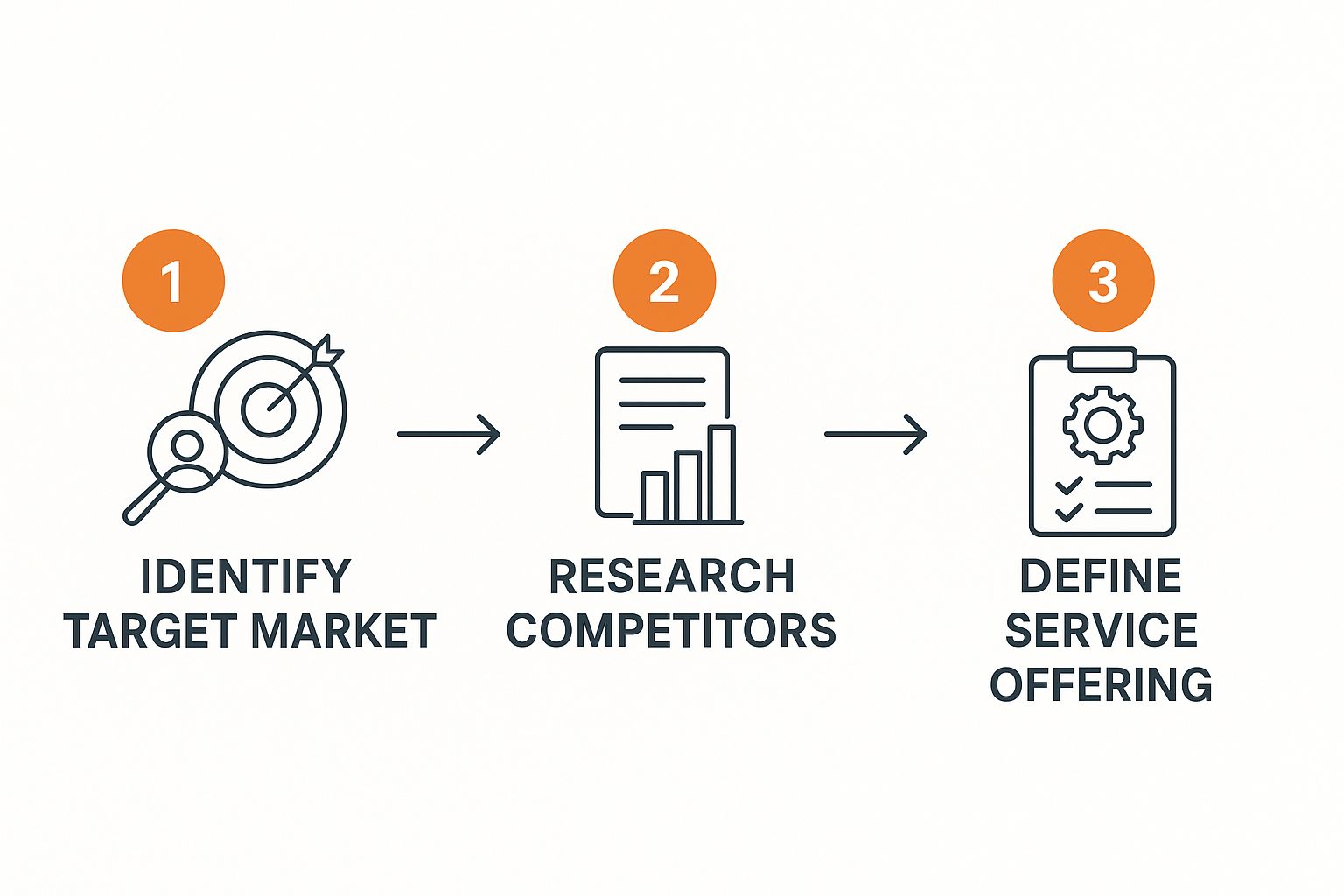
Follow this path, and you’ll build a service list that perfectly matches what your ideal customers are searching for.
Choose Your Business Structure
Next up is the legal stuff. How you set up your company affects everything from your taxes to how protected your personal stuff is if something goes wrong on a job.
- Sole Proprietor (Dueño Único): This is the simplest and most common starting point. You and the business are legally the same. It’s easy to set up, but it also means your personal assets—your house, your truck—aren’t separate from the business.
- LLC (Limited Liability Company): This is a hugely popular choice for a reason. An LLC creates a legal wall between you and your company, protecting your personal assets from business debts or lawsuits. It offers peace of mind as you grow.
Getting these pieces in place gives you the confidence to move forward. With a solid plan, you can start sourcing the right tools and materials from a dependable Orange County landscape supply store and get to work.
California Landscaping Startup Checklist
To give you a clearer picture, here’s a quick look at the essential legal steps and typical startup costs for launching your business in Orange County.
| Action Item | Why It Matters | Estimated Cost (Orange County) |
|---|---|---|
| Business License | Required by the city/county to operate legally. | $50 – $150 annually |
| Contractor’s License (C-27) | Needed for any project over $500; builds client trust. | $450 – $800 (exam + fees) |
| Liability Insurance | Protects you from accidents, injuries, and property damage. | $600 – $2,000+ per year |
| DBA (“Doing Business As”) | If your business name is different from your legal name. | $25 – $50 (filing + publication) |
| EIN (Employer ID Number) | Free from the IRS; required if you plan to hire employees. | $0 |
These are just estimates, of course, and your specific costs will depend on the scale of your operation. But tackling these items early on sets you up for professional, long-term success.
Licenses and Insurance: How to Start a Landscaping Business in Orange County the Right Way
Let’s get down to the brass tacks: licenses and insurance. I get it, it’s not the most exciting part of starting a business. But skipping this step is like building a house with no foundation. In California, doing things by the book protects you, your family, and the reputation you’re working so hard to build.
Think of it this way: having the right paperwork is just as important as having pro-grade tools. It tells clients you’re a serious professional, giving them the confidence to hire you for those bigger, more profitable projects. This is where you go from a guy with a mower to a legitimate business owner.
What Is the C-27 Landscaping Contractor License?
Here in California, the state has a very clear rule. If you take on any landscaping project valued at $500 or more (that includes both your labor and materials), you are legally required to have a C-27 Landscaping Contractor License. This isn’t a friendly suggestion—it’s the law, enforced by the Contractors State License Board (CSLB).
Working on bigger jobs without this license is illegal. It can lead to big fines, stop-work orders, and a black mark on your record before you even get started.
So, what kind of work does the C-27 license actually cover? Pretty much everything you’ll do:
- Softscaping: Planting trees, installing lawns, putting in shrubs, and regular maintenance.
- Irrigation: Setting up and repairing sprinkler systems, valves, and drip lines.
- Hardscaping: Building patios, laying pavers for walkways, and constructing retaining walls.
- Drainage: Installing systems to make sure water flows correctly and doesn’t damage property.
To get your C-27, you’ll need to prove you have at least four years of real-world, hands-on experience and pass a two-part exam. One part tests your trade knowledge (plant ID, irrigation, etc.), while the other covers business and law. It’s a process, but it’s what separates the pros from the amateurs.
I’ve seen a lot of guys try to fly under the radar with small cash jobs. But you can’t build a real business that way. Getting your C-27 license is the first real step that opens the door to projects that can truly support your family.
Our bilingual customer support team is here to help you figure out which projects require a C-27, so you can stay compliant as your business grows. (Nuestro equipo bilingüe puede ayudarte a entender los requisitos.)
Why Business Insurance Is a Non-Negotiable
If the C-27 license is your permit to work, then business insurance is what lets you sleep at night. Accidents happen on a job site, no matter how careful you are. A rock kicked up by a string trimmer can shatter a client’s glass door. An employee could throw out their back lifting pavers.
Without the right insurance, one bad day could wipe out your business and your personal savings. It’s not worth the risk.
For any landscaping business in California, there are two types of coverage you absolutely must have.
- General Liability Insurance: This is your shield against property damage or injury claims. If your crew accidentally cuts a cable line or a client trips over a shovel, this policy covers the legal and medical costs.
- Workers’ Compensation Insurance: The law in California is clear: if you have even one employee, you need workers’ comp. This insurance covers medical bills and lost wages if an employee gets hurt on the job. It also protects you, the owner, from being sued directly by that injured employee.
Imagine one of your crew strains their back lifting a heavy bag of soil amendment. Workers’ comp handles their doctor visits and helps cover their lost pay. Without it, you’d be paying those bills out of your own pocket.
Putting these protections in place isn’t just about following rules; it’s about building a strong company. At EverGrow, we’re proud to support hardworking professionals who do things the right way—from using reliable tools built for hard work to making sure their business is covered. We’re here to be your partner, and that includes helping you manage costs with our wholesale pricing on landscaping supplies.
Equipping Your Crew with The Right Tools for The Job
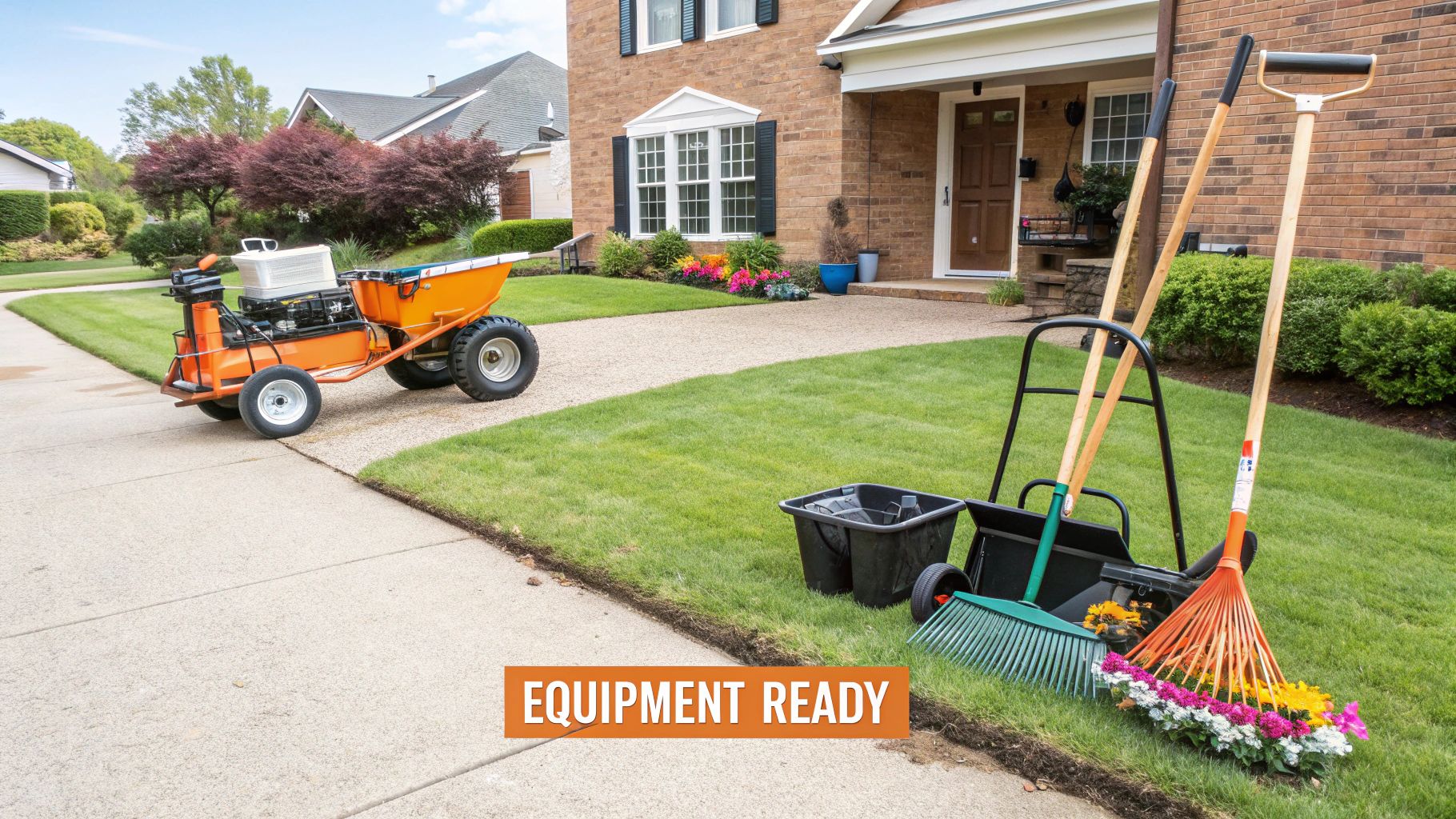
Let’s be real: reliable equipment is what separates the pros from the guys who just own a mower. Your tools are your reputation. At EverGrow, we supply the professional tools you’ll need if you’re learning how to start a landscaping business in Orange County. When they work, you’re fast, your crew is safe, and the job looks sharp. Investing in quality gear from day one is one of the smartest moves you’ll make.
This isn’t about buying the flashiest brands. It’s about choosing tools that can handle the daily grind here in Orange County. Think about the common jobs—clearing overgrown yards in Fullerton, installing a water-wise garden in Irvine, or handling precise maintenance for a Costa Mesa HOA. Each job demands specific, durable equipment.
The Must-Have Equipment for Every Crew
Before you can even think about specialized projects, you need a solid foundation of essential tools. This is the gear that will be on your truck every single day. Do yourself a favor and skip the cheap stuff from big-box stores; you need commercial-grade equipment built to last.
Here are the absolute non-negotiables:
- Commercial Zero-Turn Mower: For any property with decent turf, a zero-turn is a game-changer for speed and a clean cut. Stick with brands known for reliability.
- String Trimmer (Weed Eater): This is for edging sidewalks, cleaning up around trees, and hitting all the tight spots the mower can’t reach. A powerful, well-balanced model is key. Our Shindaiwa T262 is a workhorse that many of our local pros swear by.
- Backpack Blower: A powerful blower makes cleanup fast and leaves a job site looking perfect. Look for high CFM (cubic feet per minute) to move heavy debris.
- Hedge Trimmer: You’ll be shaping shrubs and hedges constantly. A good trimmer is essential.
These core pieces are the engine of your daily work. Choosing quality here pays for itself almost immediately.
Your tools are an investment, not an expense. A cheap blower that dies mid-job costs you more in lost time and reputation than a reliable one ever will. Start with quality, even if it means buying good used gear.
Smart Tech and Eco-Friendly Options
The landscaping industry is changing, and your clients are paying attention. Here in Southern California, water conservation is always a big deal. Being the go-to expert on water-saving solutions can win you a ton of business.
- Drip Irrigation Supplies: Get comfortable offering clients drip systems. It’s a huge water-saver. We stock a full range of emitters, tubing, and timers to get you started.
- Battery-Powered Equipment: More cities are putting restrictions on gas-powered blowers. Investing in a professional battery-powered lineup shows you’re forward-thinking and can work anywhere.
- Eco-Conscious Products: Using sustainable mulches and soil amendments is another great way to appeal to clients who care about the environment.
At EverGrow, we’re all about eco-conscious product sourcing, helping you find effective solutions that are better for the environment and your clients’ properties.
Buying New vs. Used Gear
So, what’s the move? A brand-new mower or a deal on a used one? Both have their place.
| Buying New Equipment | Buying Used Equipment |
|---|---|
| Pros: Comes with a warranty, latest tech, no wear and tear. | Pros: Significantly lower upfront cost, proven reliability on older models. |
| Cons: Higher initial cost, faster depreciation. | Cons: No warranty, potential for hidden issues, may need repairs sooner. |
For a new business, a smart strategy is to mix and match. Maybe you buy a brand-new, reliable string trimmer but find a well-maintained used zero-turn to save thousands.
No matter what you choose, our team can help you find the right tools and equipment with wholesale pricing to get you started without breaking the bank. And with free local delivery on orders over $500 in Orange County, we make it easy to get what you need right to your shop. If you’re tackling tree trimming or heavy brush clearing, check out our guide on choosing the right landscaping saws for every project.
Finding Clients and Pricing Services in Orange County

You’ve got the truck, the tools, and the skills. Now for the most important part: turning all that into a paycheck.
Landing your first clients and setting the right prices is when your hard work becomes a real business. This isn’t about fancy marketing; it’s about practical, on-the-ground tactics that get results right here in Southern California.
Too many new business owners get tripped up here. They either struggle to find those first jobs or, even worse, they undercharge for their services. The real goal is to build a base of loyal customers who see the value in what you do and are happy to pay a fair price for it.
Smart Ways to Find Your First Customers
When you’re just starting, you don’t need a huge ad budget. You just need to be smart and focus on what actually works locally.
- Door Hangers and Flyers: It might sound old-school, but it still works. Target the specific neighborhoods you want to be in. A clean, professional door hanger with your name, number, and a simple list of services is a direct invitation for business.
- A Professional Truck: Think of your truck as a mobile billboard. Keep it clean, and get a professional wrap or at least some quality magnetic signs with your business name, logo, and phone number. When people see your clean truck parked in their neighbor’s driveway every week, they know who to call.
- Google Business Profile: This is a must-do, and it’s free. Set up your profile, upload good photos of your best work, and ask every happy customer to leave you a review. More positive reviews mean you show up higher when someone searches for a “landscaper near me.”
The best marketing you will ever have is a job well done. A happy customer will tell their neighbors. Word-of-mouth referrals (recomendaciones) are pure gold because they come with built-in trust.
Once you land those first few jobs, focus on amazing quality and service. That’s how a one-time gig turns into a long-term maintenance contract.
Pricing Your Services for Profit
Figuring out what to charge is often the hardest part of learning how to start a landscaping business. If you charge too little, you’re leaving money on the table. Charge too much, and you’ll lose bids to the competition.
The key is finding that sweet spot where the client feels they’re getting great value and you’re making a healthy profit.
You’ve got two main ways to price your work:
- Hourly Rate (Por Hora): This works best for smaller, unpredictable jobs like a one-time garden cleanup. A typical rate in Orange County might be $45 – $75 per hour, per person, depending on the skill involved.
- Flat-Rate Pricing (Precio Fijo): This is the way to go for regular jobs like weekly lawn maintenance or larger projects like a new paver patio. You calculate your time, materials, and overhead, then add your profit margin to give the client a single, all-inclusive price.
For example, a standard weekly mow-and-blow service for a typical suburban lawn might be a flat rate of $50 – $65 per visit. To price bigger jobs accurately, you have to know your material costs. That’s where our clear wholesale pricing on all your landscaping supplies becomes your secret weapon for creating fast, profitable estimates.
Ultimately, your prices have to cover all your costs—fuel, insurance, equipment maintenance, and supplies—and still leave enough profit to pay yourself and grow the business. Don’t be afraid to charge what you’re worth. Professional, reliable service is valuable, and the right clients will happily pay for it.
Growing Your Team: From a One-Man Show to a Full Crew
Making the jump from working solo to running a crew is a huge step. It’s when your landscaping business stops being just a job and starts becoming a real company. But let’s be honest: finding good, reliable workers—and keeping them—is one of the biggest challenges you’ll face.
This isn’t just about getting more hands on deck. It’s about building a team that cares about the quality of the work as much as you do. The right crew lets you take on bigger, more profitable contracts and frees you up to focus on growing the business, not just mowing lawns.
Finding and Hiring Reliable Workers
In a competitive market like Orange County, skilled workers are in high demand. You can’t just put a “now hiring” sign on your truck and expect the best people to show up. You have to be smart and look where the good people are.
- Ask for Referrals: Your best source is almost always word-of-mouth (recomendación). Talk to other contractors, chat with your suppliers here at EverGrow, and ask other business owners you trust. A good referral is worth its weight in gold.
- Local Job Boards: Post clear, simple job descriptions on local online boards. Be upfront about the pay and the type of work. Honesty attracts serious candidates.
- Community Connections: Don’t forget about local community centers or your church. Sometimes the most dependable people are found through personal connections.
When you interview someone, keep it practical. Ask about their real-world experience. For example, “Show me how you’d trim a hedge to get a clean, straight line,” or “Walk me through how you check a sprinkler system for leaks.” Their answers will tell you more than any resume.
Creating a Culture That Makes Good People Stay
Hiring someone is the easy part. Keeping them is what builds a strong business. A good paycheck is important, but a respectful work environment where people feel valued is what makes them stick around.
This is especially true in landscaping. The work is hard, and your crew’s motivation directly impacts the quality of your service.
A crew that feels respected works harder and pays more attention to the small details. Your company culture is your secret weapon. It’s what separates the good businesses from the great ones.
It’s the simple things that make a difference. Provide clean water and make sure they take breaks on hot days. Say “thank you” for a job well done. Invest in quality safety gear from our Safety Equipment category, like proper gloves and eye protection, to show you care about their well-being. This isn’t just good management; it’s how you build loyalty.
Training Your Crew for Safety and Quality
Once you hire someone, you need to train them your way. Never assume a new hire knows how to do a job to your standards, even if they have experience. Proper training ensures every job is done safely and correctly, protecting your crew, your clients’ property, and your company’s reputation.
Create a simple checklist for every new hire:
- Safety First: Go over every piece of equipment. Show them how to safely operate the mower, the right way to handle a string trimmer, and what PPE is required for each task. No shortcuts.
- Quality Standards: Walk them through a finished job and point out what a “job well done” looks like to you. Explain the details, like creating crisp lawn edges or making sure every last leaf is cleaned up.
- Clear Communication: This is critical, especially with a bilingual team. Make sure everyone understands the plan for the day. At EverGrow, our bilingual customer support can help you get the right product names and instructions in both English and Spanish, making training much easier.
The future for landscaping is bright. The industry employed over 1.29 million people in the U.S. in 2024, with another 65,200 jobs expected to pop up by 2033. All that growth means there’s a huge opportunity for businesses that can build a skilled, stable workforce. Find out more about landscaping industry statistics.
Common Questions on Starting a Landscaping Business

Starting any business brings up a ton of questions. We get it. We’ve talked with countless landscapers getting their companies off the ground, and we hear the same concerns time and again. Here are some straight answers.
How Much Does It Really Cost to Start?
One of the biggest questions people have about how to start a landscaping business in Orange County is how much it really costs. For a small, one-person operation here in Orange County, you should plan for a startup budget between $10,000 and $20,000.
That range covers the essentials: a reliable used truck, your basic commercial-grade equipment (mower, trimmer, blower), business registration and licensing fees, a down payment on your insurance, and some starter marketing materials like business cards and door hangers.
Sure, you could finance a brand-new truck or buy advanced gear, but that pushes your costs way up. My advice? Start smart with quality used equipment. Keep your initial investment low, then upgrade once you have steady cash flow.
And don’t forget your ongoing expenses—the costs that hit you every month. These include:
- Fuel for your truck and equipment
- Monthly insurance payments
- Maintenance supplies and parts
- Marketing materials like door hangers
- Landscape supplies for jobs
These recurring costs are just as important as your startup fund.
Do I Really Need a C-27 License for Small Jobs?
Yes. Absolutely. In California, the law is clear: you must have a C-27 Landscaping Contractor license for any project totaling $500 or more in labor and materials combined. There’s no gray area.
Getting caught working on bigger jobs without a license can lead to massive fines and can seriously hurt your professional reputation before you even get started. While you can technically operate as a handyman for tiny jobs under $500, you can’t advertise yourself as a landscaping contractor.
Think of your C-27 license as the key that unlocks real growth. It’s what separates the pros from the casual side-hustlers and gives you the credibility to land larger, more profitable contracts.
It’s an investment in your future. It tells clients you’re serious and allows you to bid on the kind of projects that build a real career.
What Are the Most Profitable Landscaping Services?
While routine lawn maintenance is the bedrock of a stable landscaping business—it provides that steady income—the real money is often in more specialized work. Here in Southern California, a few services are always in high demand and get much better prices.
Consider adding these high-profit services to your menu:
- Drought-Tolerant Landscape Design (Xeriscaping): With our constant water concerns, Orange County homeowners will pay a premium for beautiful, water-wise landscapes.
- Hardscaping: Installing paver patios, walkways, and retaining walls brings in much higher profit margins than basic maintenance.
- Outdoor Lighting: Low-voltage landscape lighting is a fantastic add-on service. It requires specific knowledge but offers great returns.
- Smart Irrigation Systems: Installing and servicing smart controllers and drip systems is a valuable skill that saves clients water and money.
A smart way to grow is to start with maintenance to build your client base and ensure steady cash flow. Then, as you gain experience and capital, add one or two of these high-profit services. This strategy lets you scale your income over time. Need the right parts? Check out our full line of professional irrigation supplies.
How Can I Get Customers with a Small Marketing Budget?
You don’t need a huge marketing budget to find your first clients. It’s all about focusing on simple, local tactics that build a rock-solid reputation.
- Do Excellent Work: Your best marketing tool is a job done right. Happy customers tell their friends and neighbors. That word-of-mouth referral (recomendación) is the most powerful advertising you can get.
- Use Door Hangers: Don’t underestimate this old-school method. Get professional door hangers printed and walk the specific neighborhoods you want to work in. It’s direct, targeted, and it still works.
- Brand Your Truck: Your truck is a mobile billboard. A clean logo and a clear phone number on the side will get you calls from people who see you working in their area.
- Set Up a Google Business Profile: This is a must-do, and it’s free. Fill it out completely with great photos of your work and—this is key—ask every happy customer to leave you a review. Positive reviews build trust and help you show up when people search for landscapers nearby.
These simple steps build a strong local reputation for quality and reliability, which will bring in more work than expensive ads ever could.

